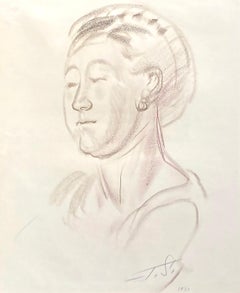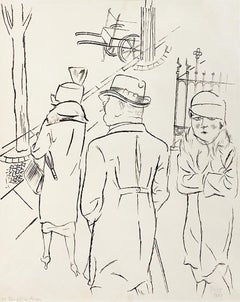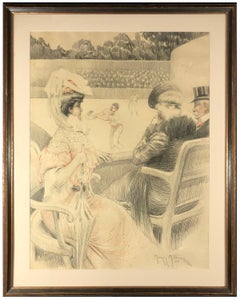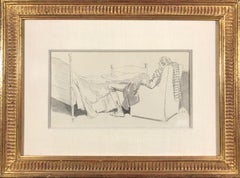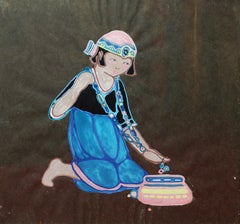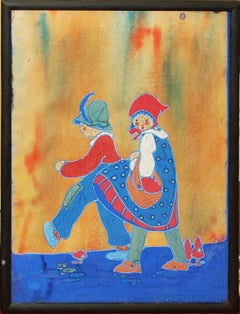Early 20th Century Figurative Drawings and Watercolors
to
185
1,528
283
134
31
13
Overall Width
to
Overall Height
to
253
1,544
10,175
3,963
209
264
406
662
572
839
884
985
527
363
177
1,020
92
77
72
20
10
6
4
2
1
1
1,241
707
39
1,635
934
815
635
597
476
270
185
96
88
80
75
66
64
54
51
43
40
40
37
748
739
697
588
570
185
47
23
17
17
577
986
1,080
498
Period: Early 20th Century
Head Study, 1930
By John Sloan
Located in Missouri, MO
Head Study, 1930
John Sloan (1871-1951)
Signed Lower Right
10.5" x 9" Unframed
19" x 16.5" Framed
Born in Lock Haven, Pennsylvania, John Sloan became one o...
Category
Ashcan School Early 20th Century Figurative Drawings and Watercolors
Materials
Paper, Conté
Price Upon Request
Berlin Street Scene
By George Grosz
Located in New York, NY
Ink wash on paper
Signed and dated, l.r.
This artwork is offered by ClampArt, located in New York City.
Category
Other Art Style Early 20th Century Figurative Drawings and Watercolors
Materials
Paper, Ink
Price Upon Request
A Close Competition
Located in Missouri, MO
Maurice Milliere (1871-1946)
"A Close Competition" 1905
Colored Pencil on Paper
Signed and Dated Lower Left
Site: approx. 35 x 36 inches
Framed: approx. 43 x 35 inches
Born at Le Havre in Normandy on 12th December 1871, Millière began his art education in his home town but soon transferred to l'Ecole des Beaux-Arts in Paris, where he studied portraiture, life drawing and figure painting in the atelier of Leon Bonnat, whose pupils included Toulouse-Lautrec and Raoul Dufy. He also studied at l'Ecole des Arts Decoratifs. His skill as a draughtsman translated quickly into success as a cartoonist and illustrator and his brilliant interpretation of the "Modern Parisienne" soon became known as the "Petite femme...
Category
Art Nouveau Early 20th Century Figurative Drawings and Watercolors
Materials
Paper, Color Pencil
Price Upon Request
Gentleman Napping in a Chair (Possibly for Ichabod Crane or other Illustration)
Located in Missouri, MO
Everett Shinn
"Gentleman Napping in a Chair" (Illustration)
Pen and Ink on Paper
Initialed "E.S." Lower Right
Displaying an early aptitude for drawing, coupled with a strong interes...
Category
American Realist Early 20th Century Figurative Drawings and Watercolors
Materials
Paper, Ink, Pen
The Necklace and the Pot
Located in Missouri, MO
Gisella Loeffler
"The Necklace and the Pot" c. 1919
Gouache on Paper
Initialed Lower Left
Framed Size: approx 15 x 15 inches
In a village filled with colorful characters, few Taos artists were as colorful as Gisella Loeffler [1900-1977]. From her handmade Austrian clothing and hand-painted furniture to whimsical paintings and letters written in multicolored crayon, joyful color defined the artist, who early on chose to use simply Gisella as her professional name and was known as such to everyone in Taos.
In spite of her fame there—the Taos News once labeled her a Taos legend—Gisella is rarely included in scholarly discussions of the Taos Art Colony. This oversight is likely due to the naive quality of her work, in which children or childlike adults inhabit a simple, brightly colored world filled with happiness. The macabre, the sad, the tortured, the offensive—all have no place in Gisella’s paintings. Her naive style of work looks very different from that of the better-known early Taos artists. Yet both Gisella’s artwork and her interesting life command attention.
Born in Austria, Gisella came to the United States with her family in 1908, settling in St. Louis, MO. After studying art at Washington University in St. Louis, she became a prominent member of the local art community, joining the St. Louis Art Guild as well as the Boston Society of Arts and Crafts. In addition to creating posters for the St. Louis Post Dispatch, Gisella won prizes from the Artists Guild of the Author’s League of America in 1919 and 1920 and from the Kansas City Art Institute in 1923. She also began working in textiles, including batik, to which she would return later in her career.
In the early 1920s Gisella married writer and music critic Edgar Lacher. A difficult character, Lacher may have chafed under Gisella’s success, for the couple divorced in the 1930s.
Having seen a local exhibition of paintings by Taos artists Oscar Berninghaus (who was from St. Louis) and Ernest Blumenschein, Gisella felt drawn to Taos, which reminded her of the villages of her native Austria. In 1933 the single mother with two daughters, Undine and Aithra, moved to Taos, where she lived off and on for the rest of her life. She traveled frequently, spending extended periods in Mexico, South America, and California, but always returned to New Mexico.
Gisella initially applied an Austro-Hungarian folk-art style to the Indian and Hispanic subjects that she found in New Mexico. In her early work she covered her surfaces with decorative floral and faunal motifs, and her images were flat with no attempt at rendering traditional one-point perspective. Eventually, though, Gisella developed her own style, often using children or childlike figures as subjects. Still, the influence of her native country’s folk art remained evident in her New Mexican, Mexican, and South American images.
In 1938 Gisella moved briefly to Los Griegos, north of Albuquerque, to be closer to medical facilities for her eldest daughter, who was suffering from rheumatic fever. Two years later, she moved to California to participate in the war effort, painting camouflage and decals on airplanes for Lockheed.
In California, Gisella broadened her range of artistic pursuits. She taught art privately, created illustrations for Scripts Magazine, and did interior design for private homes. She also designed greeting cards, a practice she continued after her return to New Mexico, where she created a series of Christmas cards.
Gisella began illustrating children’s books in 1941 when she collaborated on Franzi and Gizi with author Margery Bianco. Eventually she wrote and illustrated her own book, El Ekeko, in 1964. She also designed ceramics—her Happy Time Dinnerware, marketed by Poppy Trail...
Category
Modern Early 20th Century Figurative Drawings and Watercolors
Materials
Gouache
Price Upon Request
Going for a Stroll
Located in Missouri, MO
Gisella Loeffler
"Going for a Stroll" c. 1919
Gouache on Paper
Initialed
Framed Size: approx 17 x 13 inches
In a village filled with colorful characters, few Taos artists were as colorful as Gisella Loeffler [1900-1977]. From her handmade Austrian clothing and hand-painted furniture to whimsical paintings and letters written in multicolored crayon, joyful color defined the artist, who early on chose to use simply Gisella as her professional name and was known as such to everyone in Taos.
In spite of her fame there—the Taos News once labeled her a Taos legend—Gisella is rarely included in scholarly discussions of the Taos Art Colony. This oversight is likely due to the naive quality of her work, in which children or childlike adults inhabit a simple, brightly colored world filled with happiness. The macabre, the sad, the tortured, the offensive—all have no place in Gisella’s paintings. Her naive style of work looks very different from that of the better-known early Taos artists. Yet both Gisella’s artwork and her interesting life command attention.
Born in Austria, Gisella came to the United States with her family in 1908, settling in St. Louis, MO. After studying art at Washington University in St. Louis, she became a prominent member of the local art community, joining the St. Louis Art Guild as well as the Boston Society of Arts and Crafts. In addition to creating posters for the St. Louis Post Dispatch, Gisella won prizes from the Artists Guild of the Author’s League of America in 1919 and 1920 and from the Kansas City Art Institute in 1923. She also began working in textiles, including batik, to which she would return later in her career.
In the early 1920s Gisella married writer and music critic Edgar Lacher. A difficult character, Lacher may have chafed under Gisella’s success, for the couple divorced in the 1930s.
Having seen a local exhibition of paintings by Taos artists Oscar Berninghaus (who was from St. Louis) and Ernest Blumenschein, Gisella felt drawn to Taos, which reminded her of the villages of her native Austria. In 1933 the single mother with two daughters, Undine and Aithra, moved to Taos, where she lived off and on for the rest of her life. She traveled frequently, spending extended periods in Mexico, South America, and California, but always returned to New Mexico.
Gisella initially applied an Austro-Hungarian folk-art style to the Indian and Hispanic subjects that she found in New Mexico. In her early work she covered her surfaces with decorative floral and faunal motifs, and her images were flat with no attempt at rendering traditional one-point perspective. Eventually, though, Gisella developed her own style, often using children or childlike figures as subjects. Still, the influence of her native country’s folk art remained evident in her New Mexican, Mexican, and South American images.
In 1938 Gisella moved briefly to Los Griegos, north of Albuquerque, to be closer to medical facilities for her eldest daughter, who was suffering from rheumatic fever. Two years later, she moved to California to participate in the war effort, painting camouflage and decals on airplanes for Lockheed.
In California, Gisella broadened her range of artistic pursuits. She taught art privately, created illustrations for Scripts Magazine, and did interior design for private homes. She also designed greeting cards, a practice she continued after her return to New Mexico, where she created a series of Christmas cards.
Gisella began illustrating children’s books in 1941 when she collaborated on Franzi and Gizi with author Margery Bianco. Eventually she wrote and illustrated her own book, El Ekeko, in 1964. She also designed ceramics—her Happy Time Dinnerware, marketed by Poppy Trail...
Category
Modern Early 20th Century Figurative Drawings and Watercolors
Materials
Gouache
Price Upon Request
The Flirtation
By Allesandro Battaglia
Located in Missouri, MO
Allesandro Battaglia (1870-1940, Italian)
"The Flirtation" 1906
Watercolor on Paper
Signed "A. Battaglia, Roma 1906"
Site Size: 30 x 20 inches
Framed Size: approx 41 x 33 inches
Son of Clelia Bompiani and Ercole Battaglia, he was trained by his grandfather Roberto Bompiani...
Category
Realist Early 20th Century Figurative Drawings and Watercolors
Materials
Watercolor, Archival Paper
Price Upon Request
Les Amie
Located in West Hollywood, CA
Presenting an original pastel on paper by Fernando Luziarte.
"Les Amie" is an original pastel, signed, dated 1924, with an image dimesnion of 19 x 25 inches, offered in good origi...
Category
Art Deco Early 20th Century Figurative Drawings and Watercolors
Materials
Pastel
Price Upon Request
Daydream
Located in West Hollywood, CA
An original watercolor by Hungarian artist Gertrude Klaris. Klaris worked in oils but pramrily in mixed media works on paper, much of her style is akin to her love of stained glass.
...
Category
Symbolist Early 20th Century Figurative Drawings and Watercolors
Materials
Watercolor
Price Upon Request
Shadows
Located in West Hollywood, CA
Presenting an original mixed media watercolor by Hungarian artist Bela Kadar.
Bela Kadar was a historically important artist, is work was included as part of the degenerate art movement of Nazi Germany. His works appeared illustrated in the famous German arts magazine Der Sturm...
Category
Expressionist Early 20th Century Figurative Drawings and Watercolors
Materials
Gouache
Price Upon Request
Femme et Chien
Located in West Hollywood, CA
Presenting an exceptional Art Deco original pastel by Spanish artist Fernando Luziarte.
"Femme et Chien", is an original pastel, signed, dated 1924, with an image dimension of 19 ...
Category
Art Deco Early 20th Century Figurative Drawings and Watercolors
Materials
Oil Pastel, Paper
Price Upon Request
Recently Viewed
View AllMore Ways To Browse
Appalachian Painting
Army Navy Poster
Arthur Walker Redgate
B Harvey
Bachelor Buttons
Barnett Newman Cantos
Beatles Lithograph
Bernard Martin
Black And Tan Terrier
Borzoi Painting
Botanical Print California
British Empire Painting
Buddy Holly
Burford Painting
Burro Paintings
Capitola Painting
Cavalier Dog Painting
Chinese Tiger Painting
